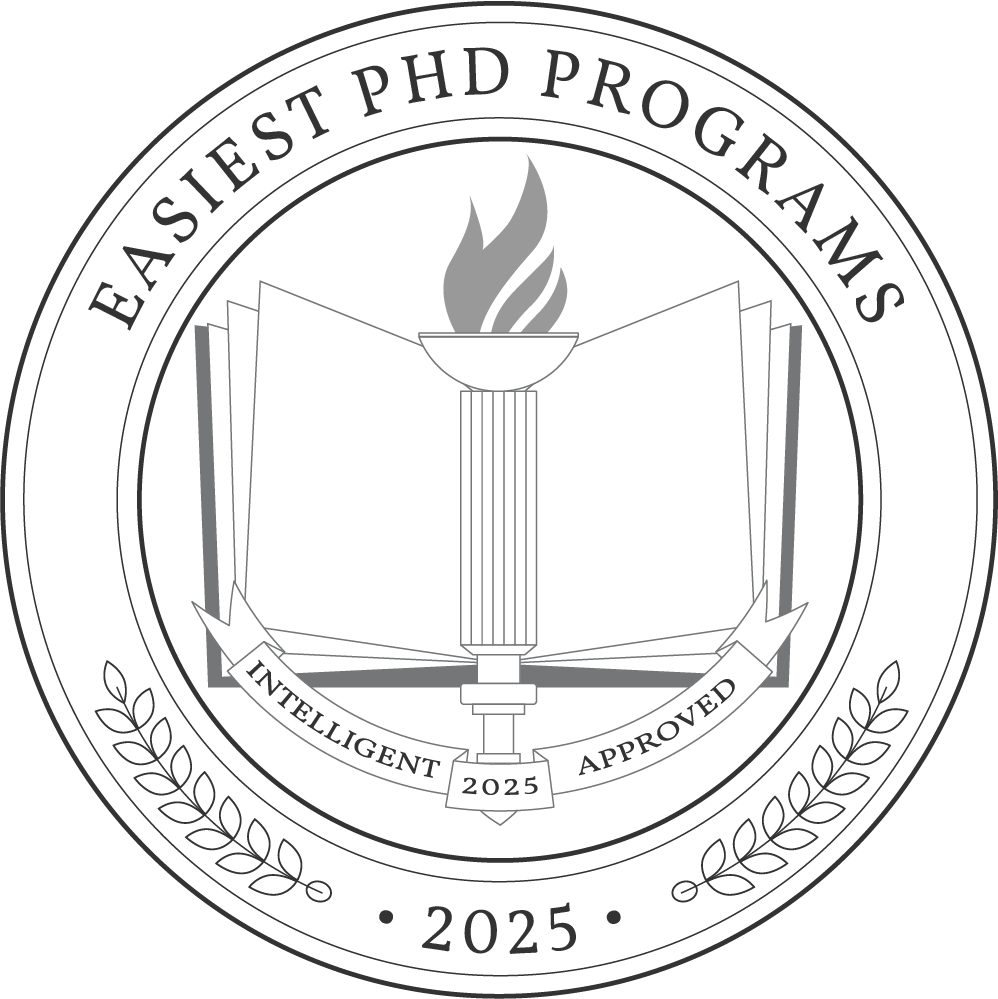A Doctor of Philosophy (PhD) degree is the pinnacle of academic achievement, the highest degree a student can obtain in most fields. It typically qualifies students for the most advanced jobs available. Therefore, earning a PhD is typically a rigorous process that requires a commitment of time and energy as well as an extensive educational and professional background in a chosen field.
The easiest PhD programs remove as many barriers as possible to earning this top degree. To help students find the easiest PhD programs, Intelligent.com reviewed programs based on their accessibility, flexibility, convenience, and cost, resulting in this list. Students can also learn more about different types of doctoral degrees and how to choose the easiest PhD program that’s right for them.
Why Trust Us
The Intelligent.com Higher Education Team is dedicated to providing students with independent, equitable school and program rankings and well-researched resources. Our expert-driven articles cover topics related to online colleges and programs, paying for school, and career outlooks. We use data from the U.S. Department of Education’s College Scorecard, the National Center for Education Statistics, and other reputable educational and professional organizations. Our academic advisory team reviews content and verifies accuracy throughout the year for the most current information. Partnerships do not influence rankings or editorial decisions.
- Analyzed over 2,000 national, accredited, and nonprofit colleges and universities
- 800+ rankings pages are reviewed and updated yearly
- Content is informed by reputable sources, surveys, and interviews with academic advisors and other experts
- Over 100 data points are reviewed for accuracy and quality throughout the year, including sources
How we rank schools
Our list features the best PhD degree programs at top colleges nationwide. Each school featured is a nonprofit, accredited institution — either public or private — with a high standard of academic quality for post-secondary institutions.
We evaluated each school’s program on tuition costs, admission, retention and graduation rates, faculty, reputation, and the student resources provided for online students. We collected data from trusted sources like the National Center for Education Statistics, individual school and program websites, school admissions counselors, and other data sources. Then, we calculated the Intelligent Score on a scale of 0 to 100 based on the following criterion:
Academic Quality:
- Admission rate versus enrollment rate
- Retention rate of students who return after year one
- Accreditation status (regional and programmatic)
- Nonprofit status, both private and public institutions
Graduation Rate
- Overall graduation rate
- Total number of currently enrolled students, including diversity metrics
- Student-to-faculty ratio
Cost and ROI
- In-state and out-of-state per-credit tuition rates and fees
- Required credits to graduate
- Earning potential after graduation
- Availability of federal student loans, scholarships, and other financial aid options
Student Resources
- Available student services for online-only and hybrid programs
- On-campus amenities like tutoring centers and the number of libraries
Read more about our ranking methodology.
Best 9 Easiest PhD Programs
FiltersInstitution Type
Status
- Intelligent Score
- Alphabetically By University Name
- Acceptance Rate
- Enrollment
- In-state Graduate Tuition
- Out-of-state Graduate Tuition
- In-state Undergraduate Tuition
- Out-of-state Undergraduate Tuition

Liberty University
Intelligent Score: 98.37In-state: $14,791
Out-of-state: $14,791
In-state: $7,935
Out-of-state: $7,935
SAT: 1040-1250
ACT: 21-29
$190 - $316
On-Campus
Commission on Accrediting of the Association of Theological Schools
57

The University of Texas at El Paso
Intelligent Score: 98.3In-state: $11,448
Out-of-state: $40,032
In-state: $12,028
Out-of-state: $12,028
SAT: 1210-1470
ACT: 26-33
Resident: $495
Non-Resident: $1,023
On-Campus
Southern Association of Colleges and Schools Commission on Colleges
45-51

Prescott College
Intelligent Score: 97.21In-state: $31,944
Out-of-state: $31,944
In-state: $14,880
Out-of-state: $14,880
SAT: 1095-1290
ACT: 15-24
$1,298
On-Campus, Online
Higher Learning Commission
72

USC Rossier School of Education
Intelligent Score: 96.28In-state: $12,288
Out-of-state: $33,528
In-state: $13,737
Out-of-state: $13,737
SAT: 1140-1340
ACT: 25-31
$2,805 - $3,366
Hybrid
WASC Senior College and University Commission
33

University of Michigan
Intelligent Score: 95.47In-state: $16,520
Out-of-state: $53,669
In-state: $24,344
Out-of-state: $24,344
SAT: 1340-1520
ACT: 31-34
Resident: $1,510
Non-Resident: $3,040
On-Campus
Higher Learning Commission
18

Drexel University
Intelligent Score: 93.90In-state: $53,868
Out-of-state: $53,868
In-state: $36,234
Out-of-state: $36,234
SAT: 1180-1380
ACT: 25-31
$1,481
On-Campus, Online
Middle States Commission on Higher Education
59

The University of Tennessee, Knoxville
Intelligent Score: 92.63In-state: $11,332
Out-of-state: $28,522
In-state: $11,468
Out-of-state: $11,468
SAT: 1140-1303
ACT: 25-31
In-State: $639
Out-of-State: $1,011
On-Campus
Southern Association of Colleges and Schools Commission on Colleges
51

University of Arkansas
Intelligent Score: 92.28In-state: $7,568
Out-of-state: $24,056
In-state: $7,752
Out-of-state: $7,752
SAT: 1090-1280
ACT: 23-29
Resident: $437
Non-Resident: $1,190
Hybrid
Higher Learning Commission
60

University of Wisconsin - Milwaukee
Intelligent Score: 90.31In-state: $9,273
Out-of-state: $37,161
In-state: $10,728
Out-of-state: $10,728
SAT: 1260-1460
ACT: 27-32
Resident: $694
Non-Resident: $1,040 - $1,533
On-Campus, Online
Higher Learning Commission
54
Types of Doctoral Degrees
At the doctoral level of study, there are two types of degrees: the Doctor of Philosophy (PhD) and professional doctorate degrees, such as Doctor of Education (EdD), Doctor of Business Administration (DBA), and Doctor of Psychology (PsyD).
PhD programs are research-focused, with students aspiring to add to the body of knowledge for their chosen profession. Students in PhD programs typically spend the first one to two years of their program completing coursework before spending another three to five years conducting research and writing their dissertation under the guidance of a faculty member. PhD programs culminate when students successfully defend their dissertations before a faculty committee. Individuals who earn a PhD typically go on to teach at the post-secondary level or step into research positions in universities, private companies, think tanks, and government.
Professional degrees emphasize advanced technical and practical skills in a given profession. They help students develop the skills and knowledge they need to succeed in high-level leadership positions, such as chief executive officers, school administrators, organization directors, and more. Students also learn how to take research and apply it to real-world scenarios to solve complex problems or innovate new methods of accomplishing goals.
In some areas of study, such as education or psychology, students can choose whether they want to earn a PhD or a professional degree. The type of degree you choose depends on your personal interests and career goals.
What to Expect from a PhD Program
As the highest level of education an individual can receive, a PhD is a significant investment of time and energy. Programs typically require anywhere from 60-90 credits, although the specific number of credits will vary by program. This usually translates to two to three years of full-time study.
While PhD programs typically include standard classroom instruction via lectures and seminars, they also usually include more independent study, research, writing, and 1:1 faculty interaction than bachelor’s or master’s degrees. Students in PhD programs may have a lot of flexibility to design independent study courses based on their particular interests or enroll in interdisciplinary courses in other departments to support their research.
The dissertation process is a key component of earning a PhD. In the first or second year of the program, students will begin brainstorming topics for their dissertation and identifying faculty members who can serve as mentors (some programs may assign a faculty member to mentor students through their dissertation process). Students must then create and submit a proposal for faculty approval before they can begin working on their dissertation. The process can take several years, depending on the topic the student is researching, and culminates when the student successfully defends their dissertation before a faculty committee.
How to prepare for a PhD program
The first step to being successful in a PhD program is taking an honest inventory of your responsibilities and available time, energy, and finances to ensure now is the right time to pursue a PhD.
While the easiest PhD programs allow students to complete their education while balancing work and family responsibilities, they still require effort. Students should have a plan for how they will accommodate classes, homework, and dissertation research and writing in their schedules before enrolling in a program.
Find out what kind of support services are available for PhD students, including financial aid, technical support, research labs and facilities, faculty availability, tutoring, and health and wellness services. All of these services may be beneficial throughout your PhD journey.
Frequently Asked Questions About PhD Programs
How much does a PhD cost?
According to the Education Data Initiative, the average cost of a PhD degree is $81,900. However, the cost of an individual program varies based on several factors, including the price per credit hour, the total number of credits the program requires, and what type of school the student attends.
Tuition is typically lowest for in-state students at public universities. For the public university programs on this list, the average per-credit tuition rate is $755 for in-state students and $1,473 for out-of-state students. Meanwhile, at private universities, the average per-credit tuition rate is $1,576.
For the most accurate information on the cost of a PhD program, speak to a financial aid counselor at the schools you’re considering.
What financial aid is available for a PhD degree?
Another financial consideration for PhD students is the type of aid they may be eligible to receive. Many doctoral programs offer fellowships or assistantships that help subsidize students’ doctoral study. When researching programs, inquire about the availability and eligibility requirements for these opportunities.
In terms of need-based aid, graduate students can apply for Direct Unsubsidized Loans and Direct PLUS Loans through the U.S. Department of Education’s Federal Student Aid program by submitting a Free Application for Federal Student Aid (FAFSA). Colleges also use the information from this application to determine eligibility for institutional need-based aid, like scholarships and grants.
Other sources of financial support include scholarships from external sources, such as professional organizations, nonprofits and private scholarship funds, and community and religious groups. Individuals who plan on working while earning a doctorate degree should find out if their employer offers tuition assistance benefits.
How long does it take to complete a PhD program?
The specific completion time for a PhD program depends on factors like the total number of credits the program requires, the pace at which a student progresses through the program, and how much time students spend on their thesis.
Most PhD programs take three to five years to complete, at minimum, including the time it takes to research and write a dissertation. The length of time a student spends on their dissertation varies based on the particular field, dissertation topic, funding, research parameters, and other factors. Many programs have a limit of three to five years for students working on their dissertation, but these policies also vary by program.
Professional doctorate programs may take less time to complete, as they focus more on developing practical skills. They also typically have fewer credit requirements than PhDs. Students earning a professional doctorate can expect to spend 1-3 years enrolled in their program.
What are the admissions requirements for a PhD?
The advanced nature of PhDs means that most programs have a rigorous application process and are quite selective. Students should carefully review application steps and admissions requirements before beginning an application.
Most PhD programs require that students have a master’s degree, while professional doctorate programs may be open to students who have only obtained a bachelor’s degree. Doctoral programs may also seek applicants with a minimum amount of professional work experience in their field.
Applications for PhD programs commonly include the following materials:
- Application and required fees
- Official transcripts from all previously attended post-secondary institutions
- Letter(s) of recommendation
- Personal statement
- Resume or CV
- GRE scores
Because PhDs are research- and writing-intensive, programs also commonly request writing samples, such as a master’s thesis, manuscript, or journal articles. In-person or virtual interviews with faculty are also common in the PhD application process.
What can you do with a PhD?
Individuals who earn PhDs are generally considered to have the most advanced knowledge and skills in their field. Therefore, they have a range of options that might not be available to them otherwise.
Teaching at the post-secondary level is a common career path for PhD graduates. According to the Bureau of Labor Statistics, the employment of college professors is expected to increase by 8% through 2032. College professors earn a median annual wage of $84,380, although the field in which a professor teaches can impact their salary.
Individuals with a PhD may also choose to focus on conducting and publishing research in their field. Researchers may work for academic institutions, governments, think tanks, non-profits, and private companies.
Many highly specialized jobs require a doctorate degree, such as psychologist, lawyer, and pharmacist.
How to Choose the PhD Degree Program That’s Right For You
Choose your area of study
The first step in selecting a PhD program is determining what you will study. You likely already have an idea in mind based on your educational and professional background, but some fields offer multiple different doctoral study options. For example, students who want to pursue a doctoral degree in education can focus on curriculum and instruction, educational administration, educational leadership, or higher education administration.
Depending on your field, you may also have to decide between a research-focused PhD or a skills-based professional doctorate.
Also, consider if a doctorate degree is necessary for your career field or the position you aspire to. In some professions or jobs, a master’s degree is sufficient graduate education. These programs, while rigorous, may be shorter and more cost-effective than a PhD.
Consider your needs
The easiest PhD program is one that will fit into a student’s life with as little disruption as possible. Depending on your circumstances, this may mean attending a program with evening and weekend classes or low-residency requirements.
It also likely means looking at the program’s overall credit requirements and determining how long it will take to finish the program, based on full-time and part-time requirements.
Students should also consider whether they can relocate to attend an in-person PhD program or if they need the flexibility and accessibility of an online doctorate program to earn their degree.
Research schools and programs
Most students start their research by visiting a school’s website, which typically publishes information about curriculum, faculty, experiential learning requirements, student outcomes, cost, and admissions requirements. If you have specific questions, contact the school’s admissions office or attend virtual or in-person information sessions, if available.
To help you determine if a program is a good fit, ask the following questions:
- What is the program’s curriculum? How does it align with your interests and goals?
- Who are the faculty members, and what are their qualifications?
- Are there internship requirements or other experiential learning components?
- What networking opportunities are available to students?
- What support services does the institution offer graduate students, including tutoring, tech support, and mental health care?
- What type of accreditation does the institution and program have?
- How much will you be able to reduce the cost of your PhD program through grants, fellowships, and other financial aid resources?
Confirming the school’s accreditation status is essential, as this can impact your eligibility for financial aid, future employment, and further educational opportunities. Colleges in the U.S. can have regional or national accreditation, with regional accreditation being the more widely recognized accreditation status. To verify a school’s accreditation status, visit the Council for Higher Education Accreditation’s database.
Review admissions and eligibility requirements
Because they are terminal degrees, PhD and professional doctorate programs typically have the most rigorous admissions procedures and eligibility requirements. These programs are also typically selective, as students require more faculty resources for instruction and research.
Students should carefully review these requirements before beginning an application to ensure they have the right qualifications.
Specific eligibility criteria will vary by school and program, but students must typically have a master’s degree and work experience in their field. Many PhD programs seek students who have research experience, as demonstrated through publications, manuscripts, and master’s theses. Programs also typically conduct interviews as part of the admissions process so that students can further discuss their academic and research interests and goals.

